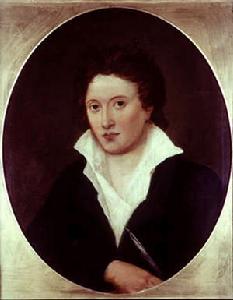百科名片
《致大法官》為雪萊所作的詩。1816年11月,雪萊的第一任妻子赫麗艾特自殺而死。同年12月雪萊和瑪麗·葛德文結婚後,赫麗艾特之父就提起訴訟,要求剝奪他對亡妻所遺一子一女的教養權。1818年2月,案件以大法官艾爾登宣判雪萊敗訴告終。理由是雪萊發表過不敬神的言論,有“罪惡”思想,不宜教養子女。這首詩是雪萊聲討英國反動統治階級和罪惡的教會的一篇戰鬥檄文。
作者簡介
珀西·比希·雪萊,是英國文學史上最有才華的抒情詩人之一。William Wordsworth曾稱其為 "One of the best artists of us all“,同時期的拜倫稱其為 "Without exception the best and least selfish man I ever knew", 更被譽為詩人中的詩人。其一生見識廣泛,不僅是柏拉圖主義者,更是個偉大的理想主義者。創作的詩歌節奏明快,積極向上。
詩歌全文
漢譯版本一
你的國家在詛咒你,貌似祭司的瘟疫,
撕裂我們母親胸膛,糾結成團的
污穢的多頭蠕蟲的最最邪惡的頂羽——
埋葬已久的體制以假面偽裝的復辟!
二
你的國家在詛咒你,被出賣的正義,
被踐踏的真理,被推到的天然界碑,
被以欺詐手段聚斂的一堆堆金幣,

都在毀滅的王廷高聲控訴有如驚雷。
三
而一直在守候著無常的指示的天使,
無疑是行動遲緩的一位,並不顧及
一個民族的哭泣,卻遷延執行她崇高的
旨意,且容你和你那一幫暫時喘息。
四
喔,讓一個父親的詛咒降禍給你的靈魂,
讓一個女兒的希望寄託於你的墳塋,
讓兩者在你皤(pó)白的頭頂化為鉛的頭巾,
壓低你的頭頂去承受迫近的覆滅命運!
五
我詛咒你,憑著橫遭蹂躪的慈父之心,
憑著長久懷抱、最近才失卻的希望,
憑著你永遠也不可能體驗的高尚柔情.
憑著你鐵石心腸從未感受過的憂傷;
六
憑著閃耀著歡樂光輝的嬰孩的微笑,
那曾是新生兒帶給家庭的溫暖火苗,
甚至在點燃的時刻就被撲滅而熄掉,
悖時的黑夜遮斷了可愛生命的明朝;
七
憑著那未經調教的口齒的幼稚的音節,
那在一個做父親的看來,一定會發育
成為最富於智慧的最高尚學問的兒語——
你卻摧殘心靈之琴——傷心啊,可恥!
八
憑著幸福的人們在小兒女的成長過程,
那甜蜜和憂愁密切交織,最傷神的疑慮
和最美妙的希望共生並育的源泉——
那蓓蕾年華的未放花朵——所見到的一切。
九
憑著所有在僱傭僕役照管下度過的那些
充滿煩悶、拘束和辛酸、抑鬱的光陰;
這樣可憐的孩子,除了你們,還能有誰?
喔,比孤兒更慘,而又不是沒有父親。
一○
憑著那些如同掛在綻開的花瓣上的毒藥,
一定會掛在他們唇邊的虛偽道學說教;
憑著以吞蝕日月的陰影籠罩他們從襁褓
直到墳墓全部人生道路的邪惡的信條;
一一
憑著你最猥褻的地獄和地獄所有的恐怖,
憑著你欺詐所造成的憂傷、瘋狂和罪孽,
這些一定會成為他們未來生活中的錯誤—
你搖搖欲墜的權力藉以建立的砂礫——
一二
憑著你同貪慾和憎恨之間的勾結,
你對眼淚的癖好,對黃金的饑渴,
隨時供你施行現成的陰謀詭計,
和你已經運用自如的卑賤的技藝;
一三
憑你致人死命的冷嘲,也憑你的笑——
憑你黑色淵藪 的一切伎倆和圈套,
而且還由於你哭得比鱷魚更加優美,
也憑你如同磨盤能砸碎人腦的假淚;
一四
憑著戕害一個父親的愛的所有的憎恨,
憑著扼殺一個父親的關懷的全部輕蔑,
憑著那隻膽敢切斷自然的崇高紐帶的
邪惡之手,憑著你,也憑著心灰望絕…
一五
是的,正是絕望在使一個父親呻吟不歇,
哭叫著“我的兒女已經不再是我的,
那脈管中流動著的可能還是我自己的血,
但是,暴君,被玷污的靈魂屬於你。”英文版本
TO THE LORD CHANCELLOR.
1.
Thy country’s curse is on thee, darkest crest
Of that foul, knotted, many-headed worm
Which rends our Mother’s bosom—priestly Pest!
Masked Resurrection of a buried Form!
2.
Thy country’s curse is on thee! Justice sold,
Truth trampled, Nature’s landmarks overthrown,
And heaps of fraud-accumulated gold,
plead, loud as thunder, at Destruction’s throne.
3.
And whilst that sure slow Angel which aye stands
Watching the beck of Mutability
Delays to execute her high commands,
And, though a nation weeps, spares thine and thee,
4.
Oh, let a father’s curse be on thy soul,
And let a daughter’s hope be on thy tomb;
Be both, on thy gray head, a leaden cowl
To weigh thee down to thine approaching doom.
5.
I curse thee by a parent’s outraged love,
By hopes long cherished and too lately lost,
By gentle feelings thou couldst never prove,
By griefs which thy stern nature never crossed;
6.
By those infantine smiles of happy light,
Which were a fire within a stranger’s hearth,
Quenched even when kindled, in untimely night
Hiding the promise of a lovely birth:
7.
By those unpractised accents of young speech,
Which he who is a father thought to frame
To gentlest lore, such as the wisest teach—
THOU strike the lyre of mind!—oh, grief and shame!
8.
By all the happy see in children’s growth—
That undeveloped flower of budding years—
Sweetness and sadness interwoven both,
Source of the sweetest hopes and saddest fears-
9.
By all the days, under an hireling’s care,
Of dull constraint and bitter heaviness,—
O wretched ye if ever any were,—
Sadder than orphans, yet not fatherless!
10.
By the false cant which on their innocent lips
Must hang like poison on an opening bloom,
By the dark creeds which cover with eclipse
Their pathway from the cradle to the tomb—
11.
By thy most impious Hell, and all its terror;
By all the grief, the madness, and the guilt
Of thine impostures, which must be their error—
That sand on which thy crumbling power is built—
12.
By thy complicity with lust and hate—
Thy thirst for tears—thy hunger after gold—
The ready frauds which ever on thee wait—
The servile arts in which thou hast grown old—
13.
By thy most killing sneer, and by thy smile—
By all the arts and snares of thy black den,
And—for thou canst outweep the crocodile—
By thy false tears—those millstones braining men—
14.
By all the hate which checks a father’s love—
By all the scorn which kills a father’s care—
By those most impious hands which dared remove
Nature’s high bounds—by thee—and by despair—
15.
Yes, the despair which bids a father groan,
And cry, ‘My children are no longer mine—
The blood within those veins may be mine own,
But—Tyrant—their polluted souls are thine;—
